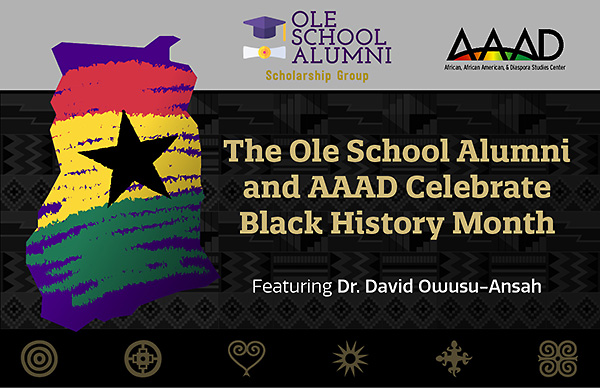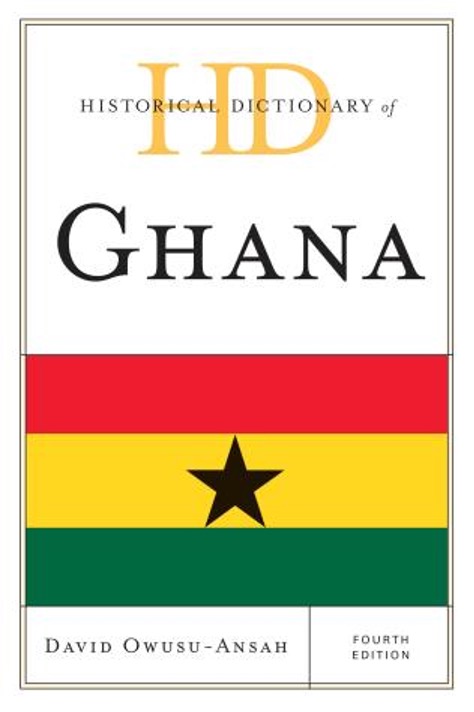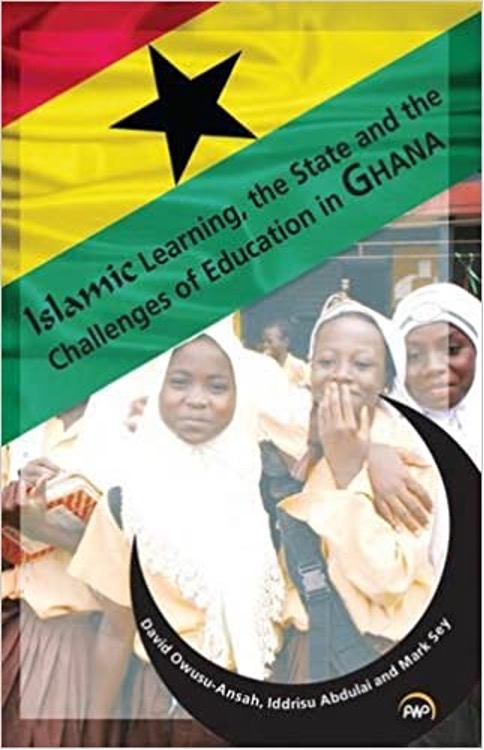
Event Description:
The Ole School Alumni Scholarship Group (OSASG) and the African, African American, and Diaspora (AAAD) Studies Center celebrated an evening filled with songs and dance to celebrate Black History Month with the special recognition of Dr. David Owusu-Ansah. MC’d by Alana Galbert and Lauren Rustin.
Click here for a PDF of the program.
Features
Click here for the full video of the event.
- “Black History in the US: Ghanian Connections” with Dr. David Owusu-Ansah, Executive Director for Access & Educational Outreach and Professor of History (0:22:20)
- Poetry by Dr. JoAnne Gabbin, Founder and Inaugural Executive Director of the Furious Flower Poetry Center and Emerita Professor of English (0:46:17)
- Performances by the students of JMU Music (0:56:00) and Dance (0:38:00)
- Remarks by Donna Harper, Vice President Access and Enrollment and Art Dean, Executive Director for Access and Inclusion (12:18)
- A Special Award by Steve and Nora Crouch on behalf of OSASG. (1:15:57)
- Tribute Video for David Owusu-Ansah
Award Details
Steve and Nora Crouch presented Dr. Owusu-Ansah a gift of $25,000 to provide travel support to students participating in the Summer in Ghana program.
Honoring David Owusu-Ansah

Click here for a PDF of David Owusu-Ansah's CV.
Dr. David Owusu-Ansah is professor of history and executive director for educational outreach at JMU. He is married to his wife, Jo Ansah for 31 years, and they have three children Ama, Cedric and Andrew.
Dr. David Owusu-Ansah arrived at James Madison University for his fall semester in 1986 and has been here since. Born in Ghana, where he received his basic education, Owusu-Ansah taught elementary and middle school pupils for three year upon graduation from teachers’ college in Ghana at the age of 19, Later, he went to Cape Coast University in Ghana for further teacher education to be qualified to teach at the secondary school level.
Nominated by the Faculty/College of Arts Council at the University of Cape Coast as their best student of the graduating class, he was offered national scholarship to pursue graduate education after a one-year required national service. Owusu-Ansah studies Islamic Studies at McGill University in Montreal, Canada prior to transferring to Northwestern University in Evanston, IL for his doctoral education. Later, he received a postdoctoral research offer at the Hebrew University in Jerusalem, Israel, prior to returning to the United States as a one-year sabbatical replacement instructor at Carleton College in Northfield MN., in 1985. This was a year, prior to his appointment at JMU as assistant professor of history in 1986.
Dr. Owusu-Ansah’s peers across the United States and internationally respect him for his scholarship. He has authored three editions of the Historical Dictionaries of Ghana and is completing another as co-author. His is also author of two books on the history of Islam and Islamic education in Ghana. As part of his scholarship, Dr. Owusu-Ansah has published many book chapters and journal articles on religion and politics, has been invited as guest speaker and panel participants across the globe and for several years, he was among the few that were invited to the Department of State to hold country-conversations with US-Appointed Ambassadors to Ghana. Dr. Owusu-Ansah currently serves on several academic journal boards, conducts peer reviews, acts as doctoral dissertation and faculty promotion reviewer for two universities in Ghana.
At JMU in 1986 when Dr. Owusu-Ansah arrived, Dr. Daniel McFarland (History Department) and his colleague, Dr. Martha Coldwell (Art Historian as the School of Art, Art History and Design) jointly taught the only Africa content course—the West African Experience. Dr. Jackie Walker of the Department of History was teaching Black American History since 1979, and Dr. Joanne Gabbin taught African-American Literature since 1984. Drs. Walker and Gabbin became Owusu-Ansah’s mentor as he navigated JMU. In addition, with support of the Department Chair, Dr. Michael Galgano, Dr. Owusu-Ansah worked with colleagues in Art History to develop additional African-content courses. Over time, JMU had Africa-content courses in Art History, Sociology-Anthropology, and the department of English to serve as the earlier incubation that evolved over time into a Black Studies Program and now the Africa-African American Studies minor. It was very clear earlier on that a purely African Studies minor or an exclusively African-America programming would not capture the attention of university leaders in terms of the impact it would make on our students. Yet, African-American parents who visited campus often asked if there were any Black studies courses in the curriculum.
By the mid-1990s, what was the Africana Studies Minor with Owusu-Ansah and Dr. Jackie Walker as the unofficial co-directors recognized the work of all faculty who taught African, African-American and all Black course-contents. Concurrently, Dr. Owusu-Ansah served as the History Department Director for Graduate Studies and the International Presidents of the Ghana Studies Council for all scholars whose research and publications centered on the West African country of Ghana. By the time he stepped down from those responsibilities in 2002, he had investigated and created for JMU the first ever study abroad on the continent of Africa. Our first group of students arrived in Ghana in May of 1997 with Dr. Owusu-Ansah as the director. The program is in its 26t year and has evolved to have an internship component. With the support of Dr. Lamont King and the William M. King Foundation of Philadelphia, the Ghana program has a Scholarship Foundation account that is able to make small contributions to deserving and diverse students with travel challenges.
The most important aspect of the Owusu-Ansah journey through JMU is his ability to collaborate with others and credit them for their contributions to what he sees as the greater good. In the context of the development of what became the African, African American and Diaspora Studies, Dr. Owusu-Ansah recognizes the contributions of past directors such as Dr. Lamont King, Dr. Jennifer Coffman, Dr. Aderonke Adesanya, Dr. Besi Muhonja and Dr. Mollie Godfrey. Dr. Jennifer Coffman and Dr. Melinda Adams (professor of political Science and association dean at CAL) supported Dr. Owusu-Ansah critically when they collaborated successfully to submit the US Department of Education grant that led to the hiring of Besi Muhonja as JMU’s Swahili faculty. Besi’s own impact as faculty and AAAD co-director has been remarkable. We credit her for the development of the AAAD Conference, which is in its 13th year. The initial support for the conference took place under Dr. Owusu-Ansah’s leadership of the Africana Minor program.
As other faculty stepped into Africana and now the AAAD leader roles, Dr. Rose tapped Owusu-Ansah to serve as Special Assistant to the President for Faculty Diversity. This was in 2007 with responsibilities to provide leadership for the president’s professor-in-residence (PIR) and to explore JMU partnerships with Historical Black Colleges and Universities (HUBCs). Dr. Owusu-Ansah continues to direct these initiatives under his title of Executive Director for Access and Educational Outreach with direct report to VP for Assess & Enrollment Management (Donna Harper). From 2019 through July 2022, Dr. Owusu-Ansah served as the inaugural associate provost for diversity. He was an integral part in the implementation of Provost Coltman’s bold academic affairs diversity initiatives.
For 36 years at JMU, Dr. Owusu-Ansah has worked as a trusted team member with colleagues and administrators. He is proud of his past contributions and looks forward to continuing to provide opportunities for our students.
Scholarship

Historical Dictionary of Ghana, Fourth Edition, Rowman & Littlefield, 2014.
Ghana, the former British colony of the Gold Coast, is historically known for being the first country to the south of the Sahara to attain political independence from colonial rule. It is known for its exports of cocoa and a variety of minerals, especially gold, and it is now an oil exporting country. But Ghana’s importance to the African continent is not only seen in its natural resources or its potential to expand its agricultural output. Rather the nation’s political history of nationalism, the history of military engagement in politics, record of economic depression and the ability to rise from the ashes of political and economic decay is the most unique character of the country.
This fourth edition of Historical Dictionary of Ghana covers its history through a chronology, an introductory essay, appendixes, and an extensive bibliography. The dictionary section has over 900 cross-referenced entries on important personalities, politics, economy, foreign relations, religion, and culture. This book is an excellent access point for students, researchers, and anyone wanting to know more about Ghana.

This study examines Islamic learning in Ghana over the 20th century. Informed and comprehensive, Islamic Learning, the State and the Challenges of Education in Ghana analyzes governmental attempts to introduce secular education through Islamic schools in a country where Muslims are a religious minority. The policy to bring such schools under the Ghana Education Service (GES) and standardized national examinations threatened the autonomy and proprietorship of the mallams (religious leaders) who had provided private Islamic tuition for generations.
Islamic learning provides comprehensive discussions about the implementation of the secularization program in a historical context—dating back to the colonial period but extending forward to the present. Central to the analysis is the formation of the Islamic Education Unit (IEU) in 1987 as an agency of the GES with the mandate to introduce the secular subjects pursued under the national curriculum into the Islamic schools. This was the era of the Provisional National Defense Council (PNDC), and the presence of a Muslim minister of education and culture, Professor Ben Abdullah, who was a Muslim trained in both traditional and secular schools. Key personalities in GES like Rashid Gbadamosi, who was similarly trained, eased the transition and the fears of Islamic proprietors of Quranic schools.
The research is far-reaching. It includes extensive field interviews and statistical information to evaluate and assess the role of the IEU, reviews the outcome of the extension of the secularization of Islamic schools from the initial experiment in Northern Ghana to the rest of the country, and evaluates the impact of the national policy of a common secular education on Arabic education and Islamic religious knowledge. While Islamic school proprietors argue that the resources devoted to religious studies have declined at a time when enrollment is expanding, critics note that in the pursuit of a national curriculum, Islamic schools cannot be allowed great exceptions and privileges from the government. The book draws on relevant biographical profiles of key personalities at the center of this important story to enrich the conversation.
Articles
Akyeampong, Emmanuel and David Owusu-Ansah. "Wealth in Knowledge: Spiritual Service and Political Power in Precolonial Asante." Journal of West African History, vol. 8 no. 1, 2022, p. 119-141. Project MUSE, muse.jhu.edu/article/857260.
Abstract:
Knowledge in many societies in precolonial Africa was understood in terms of transformative power: the smelter’s skill with iron, the potter and clay, the healer with herbs. Power in Africa though materially manifested has always been spiritually grounded. Power existed in people who had acquired the knowledge to tap into the spiritual, natural, and human worlds, and to live astride these overlapping worlds in spectacular ways. As scholars, how can we acknowledge the reality of mystical agency and its causal value in interpretation without believing in it? In this article, we explore this epistemological quandary. Tapping into precolonial Asante history and fieldwork, we have conducted with shrines and imams for the past several years we interrogate the close links between political and spiritual power. From narratives of migration stories to favorable outcomes in difficult battles, deities, priests, diviners, and Muslim clerics played critical roles that were made possible by their demonstrable religious knowledge. Asante ontology recognized the reality of spiritual power, but also a recognition that spiritual power not tied to the service of the state was problematic.
Owusu-Ansah, David. "'Off to Northern Ghana in the Morning”: Ramifications of a Trip.' Ghana Studies, vol. 18, 2015, p. 177-182. Project MUSE, doi:10.1353/ghs.2015.0008.
Opening Paragraph: Boko Haram terror activities in northeastern Nigeria that have unleashed economic hardships and political insecurity on the people have been a subject of concern, not only locally but to governments of the Economic Community of West African States (ECOWAS). While militant Islamic undertakings in the context of Nigerian history are not new, I have often wondered what Ivor Wilks would have made of these recent developments in the larger interpretation of Islam in West Africa.
Owusu-Ansah, David. “ISLAMIC INFLUENCE IN A FOREST KINGDOM: THE ROLE OF PROTECTIVE AMULETS IN EARLY 19TH CENTURY ASANTE.” Transafrican Journal of History, vol. 12, 1983, pp. 100–33. JSTOR, http://www.jstor.org/stable/24520321.
The study of the nature and importance of Islamic amulets in the history of black Africa is not a new subject. Two such studies on the subject are those of Paul Marty, 'Les Amulettes Musulman au Senegal', and Fr. George Anawati's ‘Trois Talismans Musulmans en Arabe Provenant du Mali (Marche de Mopti)'. In both studies, the authors translated Arabic texts sold by the Muslims as amulets. These studies, like many others on the subject, focus on communities within the Islamic sphere in Black Africa, while the role and significance of Islamic amulets and magic in the history of non-Islamic black African communities have so far received little attention. The present paper contributes to this neglected aspect of Islamic history in Africa
Silverman, Raymond A., and David Owusu-Ansah. “The Presence of Islam among the Akan of Ghana: A Bibliographic Essay.” History in Africa, vol. 16, 1989, pp. 325–39. JSTOR, https://doi.org/10.2307/3171790.
This paper presents an up-to-date survey of the literature pertaining to the Muslim presence among the Akan peoples of present-day Ghana. It is divided into three sections. The first surveys the limited but valuable Arabic literature; the second, the European primary sources; and the final section presents the historical, archeological, and art-historical studies that have been completed by scholars during the last thirty years.

